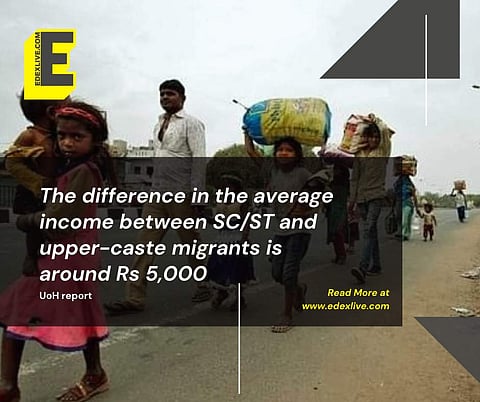

A study by the University of Hyderabad has found that the majority of workers in Telangana who migrated from Bihar and were displaced due to the COVID-19 crisis belonged to the SC/ST community. According to the study, 45 per cent of workers were from the SC/ST community and 43 per cent were from the OBC community. The study revealed that on an average, the workers from the backward castes earn marginally less than their counterparts from the upper castes and the pandemic significantly impacted their earnings.
The study was based on the data collected from 100 migrant workers from Bihar who had left the city during the beginning of lockdown. While all respondents were male, 90 per cent were Hindus and 10 per cent Muslims, found the study.
The paper titled, Impact of COVID-19 Lockdown on Bihari Migrant Labourers in Hyderabad was published in the Journal of Rural Development of the National Institute of Rural Development and Panchayati Raj.
The researchers also touched upon how caste played a role in worsening the condition of the migrant workers as they already were earning less. "The difference in the average income between SC/ST and upper-caste migrants is around Rs 5,000. The average income of the SC/ST migrant is 30 per cent less than the upper caste migrant and 15 per cent less than those belonging to the OBC category," said the report.
It further elaborated how the workers had no social security at the time of the lockdown and were affected by the loss of work severely. The ones on the lower strata of the social hierarchy had no assured housing or access to any kind of government subsidies or schemes. Only 7 per cent of workers had access to government benefits and those working in the steel plants and receiving monthly payments had accommodation provided by their employers.
"Landless labourers, Dalits, Muslims and those belonging to backward castes were the most vulnerable. The majority of them had to migrate individually as the income earned was not high enough to meet the cost of living at the destination or they had a need to look after the matters at home," said the study.
